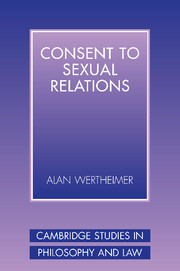Book contents
- Frontmatter
- Contents
- Preface
- Acknowledgments
- Abbreviations
- 1 Introduction
- 2 Law
- 3 The psychology of sex
- 4 The psychology of perpetrators
- 5 The harm and wrong of rape
- 6 The value of consent
- 7 The ontology of consent
- 8 Coercion
- 9 Deception
- 10 Competence
- 11 Intoxication
- 12 Sex and justice
- Appendix: Alphabetical list of hypothetical cases
- Index
4 - The psychology of perpetrators
Published online by Cambridge University Press: 04 March 2010
- Frontmatter
- Contents
- Preface
- Acknowledgments
- Abbreviations
- 1 Introduction
- 2 Law
- 3 The psychology of sex
- 4 The psychology of perpetrators
- 5 The harm and wrong of rape
- 6 The value of consent
- 7 The ontology of consent
- 8 Coercion
- 9 Deception
- 10 Competence
- 11 Intoxication
- 12 Sex and justice
- Appendix: Alphabetical list of hypothetical cases
- Index
Summary
Introduction
In this chapter, I propose to consider the psychology of nonconsensual sex from the perspective of the perpetrator. It might be thought that we cannot understand the experience of nonconsensual sexual relations without first defining its contours so that we know what range of cases we should consider. I disagree. We can start with the paradigmatic case of forcible rape, about which there is little doubt as to its nonconsensuality. We will then be better positioned to consider the host of theoretical issues that motivate this project.
Sex or violence?
It might be thought, however, that I have begged another crucial question by referring to rape as nonconsensual sex. For it is frequently said that “rape is about violence, not about sex.”(RVNS). Unpacking RVNS will set the stage for the discussion to follow, so I want to consider it in some detail. Here are some typical statements chosen almost (but not quite) at random.
In rape … the purpose of the attack is precisely to demonstrate contempt for the victim's autonomy and dignity.
… rape is more a crime of violence than of sexual passion …
… a major contribution of radical feminism is the debunking of the [sexual frustration] theory – A consensus is emerging among both feminists and criminologists that rape is quintessentially a crime of aggression and hostility, not a form of sexual release.
In recent years it has been suggested that rape is first and foremost a crime of violence. What is essential to the act is the infliction of pain and humiliation. […]
- Type
- Chapter
- Information
- Consent to Sexual Relations , pp. 70 - 88Publisher: Cambridge University PressPrint publication year: 2003
- 1
- Cited by



